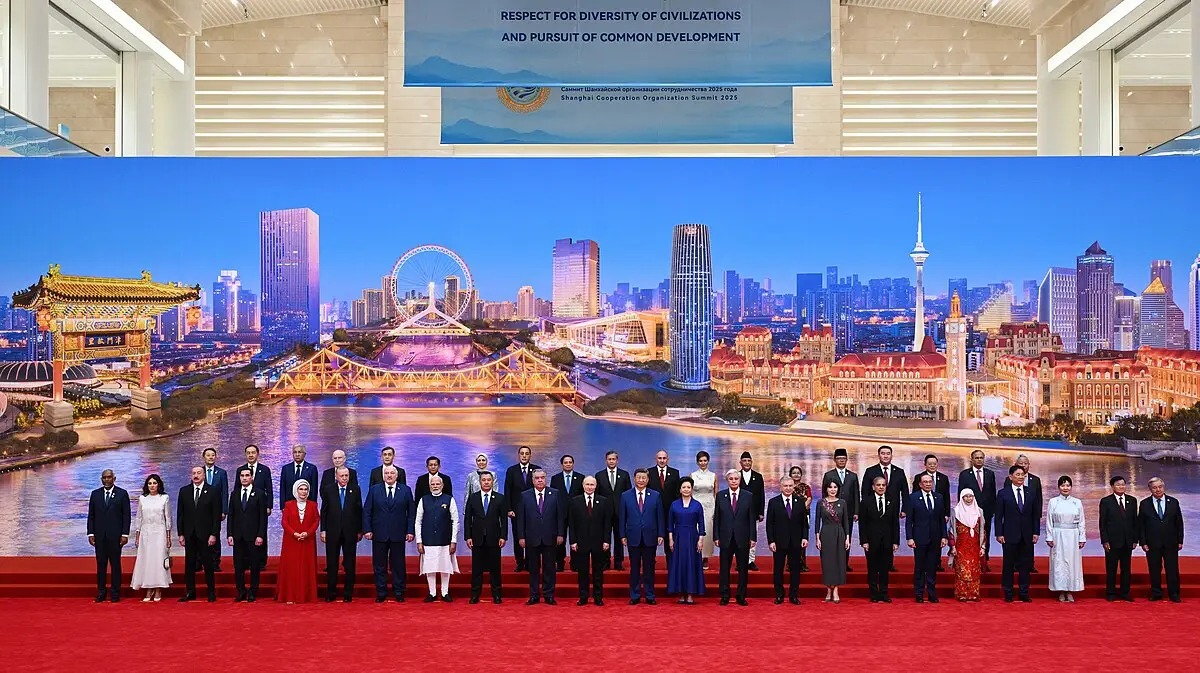
Shanghai Cooperation Organization: second day of summit underway
At the top, a new structure is being dictated on the international chessboard

The second and final day of the summit, which began yesterday, bringing together the ten members of the Shanghai Cooperation Organization (SCO), is taking place today at the port of Tianjin, China. This is a crucially important summit as it is shaping a new global order and has been promoted by China and India as an alternative to NATO.
The SCO is a permanent international intergovernmental organization founded in 2001 by Kazakhstan, the People's Republic of China, Kyrgyzstan, the Russian Federation, Tajikistan, and Uzbekistan. Belarus, India, Iran, and Pakistan subsequently joined, and close cooperation has been established with 16 other countries. Among the latter, Turkey stands out, having sent president Recep Tayyip Erdogan to Tianjin. As the organization's website explains, the SCO's objectives are: "to strengthen mutual trust, friendship, and good neighborliness among Member States; to encourage effective cooperation among Member States in such fields as politics, trade, economics, science and technology, culture, education, energy, transportation, tourism, environmental protection; to jointly ensure and maintain peace, security, and stability in the region; and to promote a new, democratic, equitable, and rational international political and economic order".
On this occasion, Indian Prime Minister Narendra Modi visited China for the first time in seven years to meet with Chinese president Xi Jinping. Recalling the recent territorial disputes between the two countries, he declared that China and India "are cooperative partners, not rivals" and that they "present mutual development opportunities, rather than threats". In response, Modi affirmed that the two powers are committed "to advancing relations on the basis of mutual trust, respect, and sensitivity".
The Chinese President also met with his Belarusian counterpart Alexander Lukashenko, while the Indian prime minister held a lengthy meeting with Russian president Vladimir Putin, who even let him ride in his limousine. The meeting confirmed the good relations between the two countries, with India continuing to purchase Russian gas. Modi expressed his hope to Putin for a swift end to the conflict in Ukraine and for a "lasting peace".
Alongside geopolitical developments, economic cooperation stands out. Chinese president Xi Jinping announced increased investments and loans to Sco partner countries to strengthen "a larger regional security bloc" and "a new stage of high-quality development and cooperation". Xi then highlighted the 2 billion yuan ($275 million) in grants for 2025, which will be complemented by another $1.3 billion in loans to an interbank consortium over the next three years. China "has invested $84 billion in Sco countries and will support the participation of 10,000 students" in Beijing's "Luban" vocational training program.
The Chinese President hopes for aligning development strategies among SCO members, along with the promotion and implementation of the Belt and Road Initiative. Xi favors strengthening economic complementarity between partners by encouraging more developed markets so that trade relations can always be a win-win situation.
For his part, Chinese vice Foreign Minister Liu Bin announced the imminent implementation of the "Tianjin Declaration" and "a ten-year development strategy", based on themes such as "neighborhood diplomacy, increased regional cooperation, institution-building, and countering transnational threats".
AVIONEWS - World Aeronautical Press Agency